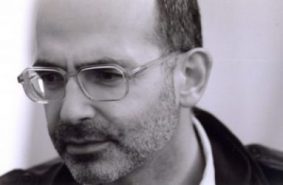
© Hartwig Klappert
Maxim Biller [Germany]
Maxim Biller was born in Prague in 1960. In 1970, after the violent end of the »Prague Spring«, his family moved to Germany. Biller studied literature in Hamburg and Munich. After graduating from the German School of Journalism, he wrote his first articles for »DIE ZEIT«, »Der Spiegel«, and »Tempo«, where he became famous with his column »100 Zeilen Hass« (tr: 100 Lines of Hate). His collection »Die Tempojahre« (1991; tr: The Tempo Years) shows his biting critique of pop literature, scholarly texts, and the cushiness of post-‘68 »common sense«. More provocative observations followed with »Land der Väter und Verräter« (1994; tr: Country of Fathers and Traitors) and »Deutschbuch« (2001; tr: German Book), in which Biller polemizes issues such as the ritualization of current Holocaust memorials.
In the »Süddeutsche Zeitung«, Peter von Becker praised Biller’s first short story collection »Wenn ich einmal reich und tot bin« (1990; tr: Someday When I’m Rich and Dead): »Since the post-war novels by Wolfgang Koeppen, since Böll’s early prose, and since essays by Hannah Arendt, Adorno, Mitscherlich, and Hans Magnus Enzensberger, I have hardly read anything that would have struck the nerve of the time with such truth and humor…« The novel »Die Tochter« (2000; tr: The Daughter), a tale with flashbacks to a day spent in Munich, shows Biller as a novelist following in the footsteps of Joyce, Döblin, and Koeppen. In »Die Tochter«, a leitmotif of incest is threaded through the stream of consciousness narration of a father who thinks he recognizes his daughter in a sex film. Scandal shrouded the novel »Esra« (2003) when the Federal Constitutional Court of Germany prohibited its sale due to alleged personality rights violations. With »Bernsteintage« (2004; tr: Amber Days) and »Liebe heute« (2007; tr: Love Today) Biller returned to short literary texts, fusing fiction and reality through his playful, biographical style. More recently, he published »Der gebrauchte Jude« (2009; tr: The Used Jew), the novella »Im Kopf von Bruno Schulz« (2013; tr: In Bruno Schulz’s Head), »Biografie« (2016), and the family novel »Sechs Koffer« (2018; tr: Six Suitcases), which was nominated for the German Book Prize: »There have been few German-language publications in the last 30 years as light and playful, and at the same time as strict, gripping, and concise about what it means to be a family.« (»Spiegel Online«)
Biller has also published children’s books and plays as well as the »Maxim Biller Tapes« (2004), a CD of songs and poems. Biller spent 18 years writing the column »Moralische Geschichten« (tr. Moral Stories) for the »Frankfurter Allgemeine Sonntagszeitung «; today, he writes the column »Über der Linden« (tr. Above the Linden Trees) for »DIE ZEIT«. His works have been translated into 16 languages and have won many awards. In 2015/2016 he participated in the ZDF TV show »Literarische Quartett« (tr: Literary Quartet), and in 2018 he was the Heidelberg lecturer in poetry (»Poetikdozentur«).
Biller lives in Berlin.
Bibliogrpahy
Wenn ich einmal reich und tot bin
Kiepenheuer & Witsch
Köln, 1990
Die Tempojahre
dtv
München, 1991
Land der Väter und Verräter
Kiepenheuer & Witsch
Köln, 1994
Harlem Holocaust
Kiepenheuer & Witsch
Köln, 1998
Die Tochter
Kiepenheuer & Witsch
Köln, 2000
Deutschbuch
dtv
München, 2001
Kühltransport
dtv
München, 2001
Esra
Kiepenheuer & Witsch
Köln, 2003
Der perfekte Roman
dtv
München, 2003
Bernsteintage
Kiepenheuer & Witsch
Köln, 2004
Adas größter Wunsch
Berlin-Verlag
Berlin, 2005
Moralische Geschichten
Kiepenheuer & Witsch
Köln, 2005
Menschen in falschen Zusammenhängen
Libelle-Verlag
Lengwil, 2006
Liebe heute
Kiepenheuer & Witsch
Köln, 2007
Der gebrauchte Jude
Kiepenheuer & Witsch
Köln, 2009
Im Kopf von Bruno Schulz
Kiepenheuer & Witsch
Köln, 2013
Biografie
Kiepenheuer & Witsch
Köln, 2016
Hundert Zeilen Hass
Hoffmann & Campe
Hamburg, 2017
Sechs Koffer
Kiepenheuer & Witsch
Köln, 2018
Literatur und Politik
Heidelberger Poetikvorlesungen
Universitätsverlag Winter
Heidelberg, 2018
